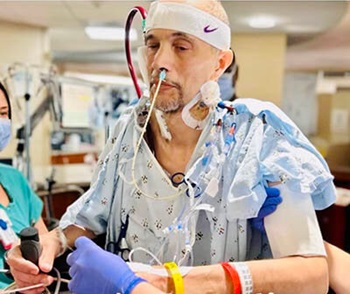
For Pastor Kelvis Reid, faith has always been his foundation. As the leader of Partakers of Christ Church in Gastonia, North Carolina, he dedicated his life to shepherding others. But in December 2023, just before Christmas, he faced a test of faith unlike any other — one that nearly cost him his life.
Reid, 65, had been experiencing health challenges for over two years. What began as an unusual flutter in his chest in June 2021 led to an atrial fibrillation (AFib) diagnosis and eventually heart ablation surgery in April 2022. Despite efforts to manage his condition, his health continued to decline. He lost over 30 pounds by 2023, but it wasn’t until a self-referral to Atrium Health Sanger Heart & Vascular Institute that he received a life-changing diagnosis: AL amyloidosis, a rare disease in which abnormal proteins build up in organs, leading to potentially fatal complications.
“I told my wife, ‘Something is wrong. I can’t do this anymore. I’m referring myself to Sanger because I’ve heard they are the best,” Reid described. “I walked in with my own records — all 1,200 pages of them. I knew I needed help, and I wasn’t going to wait.”
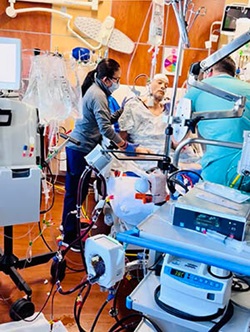 AL amyloidosis occurs when abnormal plasma cells in the bone marrow produce misfolded light chain proteins that form amyloid deposits in organs such as the heart, kidneys, liver, and nervous system. These deposits interfere with organ function and can be life-threatening.
AL amyloidosis occurs when abnormal plasma cells in the bone marrow produce misfolded light chain proteins that form amyloid deposits in organs such as the heart, kidneys, liver, and nervous system. These deposits interfere with organ function and can be life-threatening.
"AL amyloidosis can be incredibly challenging to diagnose because its symptoms often mimic other heart conditions," said Dr. Amar Parikh, cardiologist for Atrium Health’s cardio-oncology program. "By the time Kelvis came to us, his heart was already under severe stress. Our goal was to stabilize him as quickly as possible and address both the heart and the underlying amyloidosis."
“Doctor Parikh told me after running the tests, ‘I already know what’s wrong with you.’ And he was right. He told me, ‘You have amyloidosis, and it’s taken over your heart.’”
While AL amyloidosis itself is not classified as cancer, it often coexists with multiple myeloma, which is a blood cancer affecting plasma cells. Treatment for AL amyloidosis frequently involves chemotherapy and targeted therapies like those used for multiple myeloma to stop the production of harmful proteins.
A Christmas Eve crisis
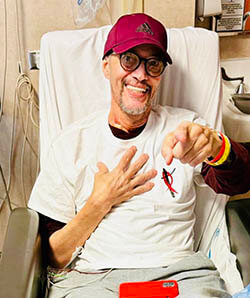 Although his medical team urged immediate hospitalization, Reid requested to wait until after the holidays. On Christmas Eve, after delivering a sermon and wrapping presents with his family, he collapsed at home. His heart had stopped. His daughter and wife, Samantha, began CPR while awaiting emergency responders.
Although his medical team urged immediate hospitalization, Reid requested to wait until after the holidays. On Christmas Eve, after delivering a sermon and wrapping presents with his family, he collapsed at home. His heart had stopped. His daughter and wife, Samantha, began CPR while awaiting emergency responders.
“I was standing there, wrapping presents with my wife… then everything looked like it was spinning. I felt burning from my legs up my neck. I said, ‘Oh Mama’ — and that’s the last thing I remember.”
Reid’s son ran upstairs and recalls his dad looking blue and lifeless. His daughter took over CPR and gave compressions while his son spoke to 911 operators. “After 15 minutes, I took a breath,” Reid said.
“When EMS got there, I coded again. They lost me for 20 minutes once, and then another 25. But they brought me back.”
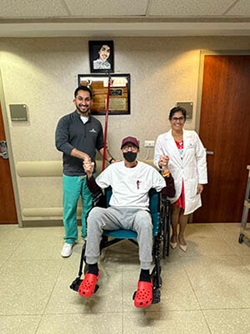 Paramedics rushed him to Atrium Health Carolinas Medical Center’s intensive cardiac care unit. There, he suffered multiple cardiac arrests and was placed on an extracorporeal membrane oxygenation (ECMO) machine, a life-support system that kept him alive by oxygenating his blood and allowing his heart and lungs to rest.
Paramedics rushed him to Atrium Health Carolinas Medical Center’s intensive cardiac care unit. There, he suffered multiple cardiac arrests and was placed on an extracorporeal membrane oxygenation (ECMO) machine, a life-support system that kept him alive by oxygenating his blood and allowing his heart and lungs to rest.
“They told my wife, ‘His heart is hard as cement — we don’t know how he was even standing.”
For 62 days, Reid remained on ECMO, fighting for his life. His doctors, including Dr. Parikh, Dr. Thomas Christopher, and Dr. Cindy Varga, coordinated an aggressive plan between cardiology and hematology. Reid was given inpatient Daratumumab, a targeted therapy for amyloidosis.
"Daratumumab is a critical drug for patients with AL amyloidosis," explained Dr. Cindy Varga, hematologist at Atrium Health Levine Cancer. "Kelvis responded incredibly well, which was key in stabilizing his condition so that we could proceed with the next steps in his care."
The response was remarkable — his light chain levels, an indicator of amyloid protein activity, showed significant improvement.
A race against time
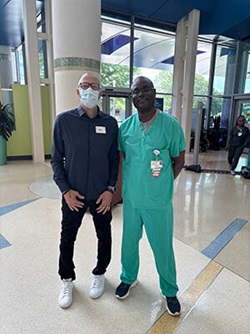 As Reid’s condition stabilized, another hurdle emerged. His multiple cardiac arrests had caused heart and kidney failure. With his heart and kidneys deteriorating, he needed a dual organ transplant to survive. But finding a match in time was a daunting challenge. Many transplant centers would have denied him organs due to the complexity of his condition.
As Reid’s condition stabilized, another hurdle emerged. His multiple cardiac arrests had caused heart and kidney failure. With his heart and kidneys deteriorating, he needed a dual organ transplant to survive. But finding a match in time was a daunting challenge. Many transplant centers would have denied him organs due to the complexity of his condition.
“Dr. Parikh fought for me. He told them, ‘Yes, he’s 65 — but he walks every day, he’s never smoked or drank. He has the strength of a 40-year-old. He deserves a chance.’”
"Given the extent of organ damage, many institutions would have considered Kelvis ineligible for transplant," said Dr. Parikh. "But at Atrium Health, we take a collaborative approach, and our team was committed to giving him every possible chance."
When a heart became available, Reid was prepared for transplant surgery. But there was another setback — he tested positive for COVID-19 and had to forgo the opportunity.
Miraculously, another heart became available just days later. On February 10, 2024, he received his new heart — coincidentally, on his mother’s birthday. The following day, he underwent kidney transplant surgery.
Defying the odds
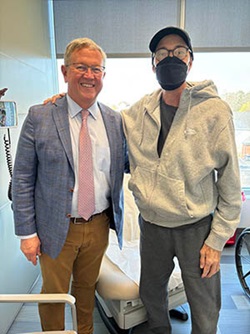 Reid’s post-transplant recovery was nothing short of extraordinary. Though he has no memory of January, he woke up to find a tube protruding from his neck. Confused, he asked his wife, “Why’d you let them do this to me?” Her response was simple: “Because it saved your life.”
Reid’s post-transplant recovery was nothing short of extraordinary. Though he has no memory of January, he woke up to find a tube protruding from his neck. Confused, he asked his wife, “Why’d you let them do this to me?” Her response was simple: “Because it saved your life.”
Throughout his 62-day hospitalization, his family never left his side. At least one member was always present, a testament to the unwavering support that sustained him during his most critical moments.
“My family was there every single day. They never left me — not for one minute.”
Today, Pastor Reid is thriving. His cancer is gone, though he continues a maintenance chemotherapy regimen. He’s back at the pulpit, preaching to his congregation. And, in a testament to his renewed strength, he even ran the Cupid’s 5K race in Charlotte earlier this year — an incredible feat considering where he was just a year ago.
“I’ve had zero rejection of either organ. Zero. That’s unheard of. But when the Lord orchestrates, He orchestrates. Every doctor I see says, ‘Here’s our miracle man.’ One even told me, ‘You’ve broken every record we have.’”
“I tell my doctors I love them every time I see them,” Reid said. “I wouldn’t be here without them. I am an anomaly, but I am also proof of what faith, family, and great medical care can do.”
A medical marvel and an inspiration
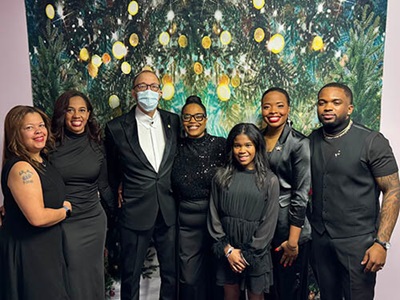 Reid’s case has drawn attention from physicians across the country. A physician from Cedars-Sinai in Los Angeles even reached out to discuss his unique medical journey. His story exemplifies the power of coordinated care between cardiology and hematology, demonstrating why Atrium Health is a leader in complex cardiac and oncological care.
Reid’s case has drawn attention from physicians across the country. A physician from Cedars-Sinai in Los Angeles even reached out to discuss his unique medical journey. His story exemplifies the power of coordinated care between cardiology and hematology, demonstrating why Atrium Health is a leader in complex cardiac and oncological care.
His wife, Samantha, remains grateful for the team that saved her husband’s life.
“They are true heroes,” she said. “Words can’t express our gratitude. God truly blessed us with a wonderful group of medical professionals.”
For those who have followed his journey, Pastor Reid is a beacon of hope. His resilience, faith, and the groundbreaking care he received at Atrium Health have given him a second chance at life — one he does not take for granted.
“I am here for a reason,” Reid said. “God kept me here to share my story, to encourage others, and to remind people that miracles still happen.”



